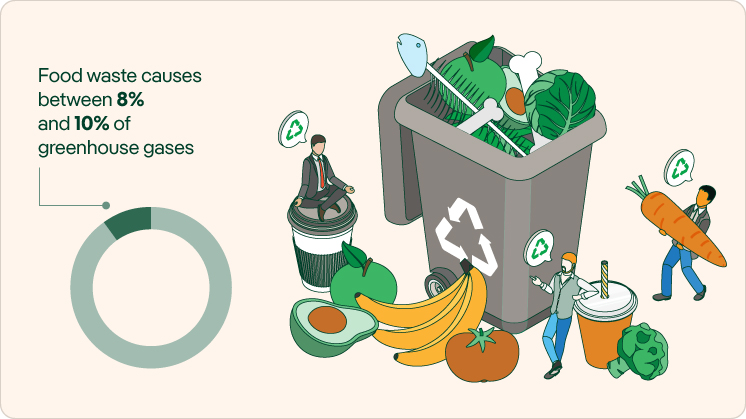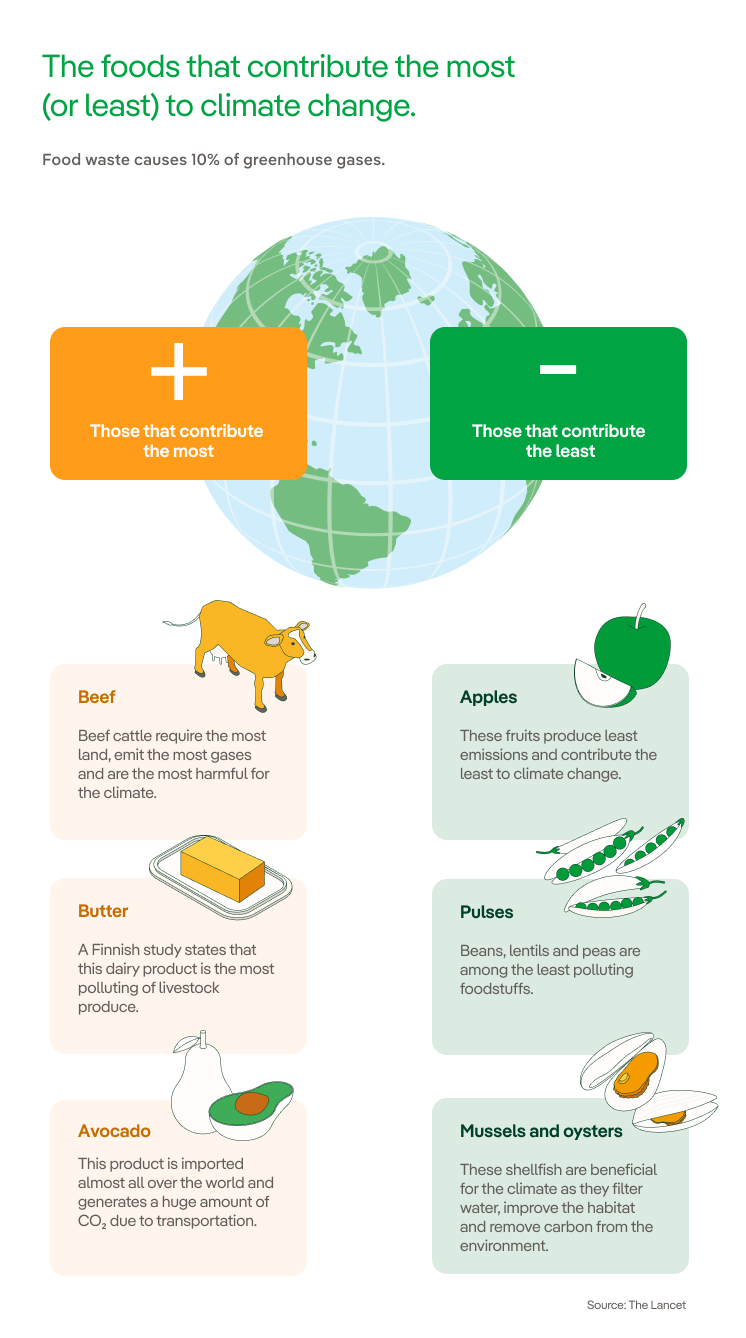Food waste
A new diet to combat the climate crisis
Our food habits contribute to global warming, a phenomenon that is threatening to cause serious harm to the planet. The Food and Agriculture Organisation of the United Nations (FAO) warns that food waste alone causes 8-10% of greenhouse gases and urges us to change our diet to reverse the situation.

We have made the Earth into a bottomless larder out of which we very often eat more than we need. The experts say: our diet has too much meat, fish, processed foods, fats, sugars and dairy products; and it is short on essential ingredients such as fruit and vegetables. This imbalance, together with an unsustainable production model, poses a threat to our health and to that of the planet, which is subject to unprecedented food stress.
Food waste and the climate crisis
Not only are we producing too much but we are wasting a great deal of food. It is estimated that the food that is lost and wasted could feed 1.26 billion hungry people every year. Meanwhile, world hunger affected about 9.2% of the world's population in 2022 and the greenhouse gases (GHG) from the food industry account for one-third of the total of the total emissions that have led to today's climate crisis.
These data come from the latest studies published by the Food and Agriculture Organisation of the United Nations (FAO), which estimates that loss and waste of food cause between 8 and 10% of the emissions of the gases responsible for global warming. According to the organisation, this food waste contributes to an unstable climate and extreme weather events such as droughts and floods, which in turn has a negative impact on crop yields and crop quality.
For example, in 2021, the FAO revealed that an estimated 931 million tonnes of food waste were generated, 61% of which came from households, 26% from catering and 13% from retail. This suggests that about 17% of the world's total food production may be wasted.
Consequences of food waste
The negative effects on the climate of food waste in turn compromise our ability to feed ourselves, in a kind of vicious circle. In this sense, climate change affects the four principles of food security:
![]() Availability
Availability
Having an adequate supply of food nationally, regionally or locally.
![]() Access
Access
Having the economic, physical or cultural capability to obtain the most basic foods.
![]() Consumption
Consumption
Purchasing hygienic, quality foods that can satisfy nutritional needs.
![]() Stability
Stability
The ability to confront cyclical or seasonal food shortages.
The UN also stresses that food loss and waste can have a negative impact on food availability, as well as contributing to the cost of food.

SEE INFOGRAPHIC: The foods that contribute the most (or least) to climate change [PDF]
How to lessen the environmental impact of food waste
Given the impact of our diet on global warming, the UN concludes that food loss and waste is one of the main challenges for the next generations, as it has a negative impact on food security and nutrition, as well as contributing significantly to greenhouse gas emissions and biodiversity loss. Hence the need for transformative change to make the most of the food that is produced.
To this end, it is essential to raise collective awareness and ensure the implementation of effective actions such as the incorporation of innovative technologies (e-commerce platforms for marketing, for example) and the adoption of new ways of working and good practices to improve food quality management. In addition, annual monitoring of the situation is necessary, as only reliable data can track progress on target 12 of the Sustainable Development Goals (Responsible Consumption and Production).
As a result, the organisation is committed to a more sustainable global approach and the implementation of early measures as a strategy for confronting climate change. It also recommends complementary policies that promote reducing demographic growth and inequality, and better nutrition and less food waste.
Circular economy model at the Iberdrola Group
At Iberdrola, we work to be more respectful of nature in our three strategic sustainability areas: climate action, biodiversity protection, and circular economy.
For this reason, our sustainable business model is based on the circular economy model, a system for making the most of resources in which priority is given to reducing the use of new raw materials through efficiency in processes, product life extensions, and a firm commitment to the reuse and recycling of materials.




